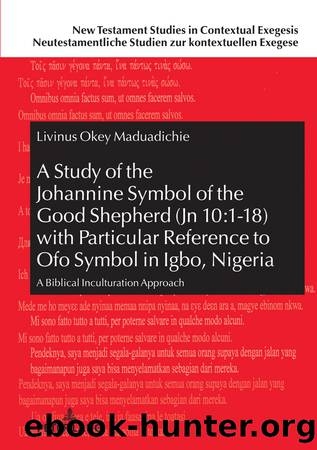A Study of the Johannine Symbol of the Good Shepherd (Jn 10:1-18) with Particular Reference to Ofo Symbol in Igbo, Nigeria by Livinus Maduadichie;

Author:Livinus Maduadichie;
Language: eng
Format: epub
Publisher: Peter Lang Copyright AG
3.5.3.1 The hired Hand: His Reaction on Sighting the Wolf
The text is clear that the hired hand is not the shepherd and does not own the sheep. Hence, he reacts to the detriment of the sheep on sighting the wolf. The reaction is considered the height of betrayal and disappointment to the flock. When the wolf emerges, the instinct of self-preservation sharply stirs up in the hireling. His immediate reaction is to think of himself and his own safety. Instead of attempting to defend and safeguard the sheep entrusted to him from the imminent danger, he provides and delivers his own security first by fleeing away.495
However, other evidences show that the flight of the hireling is not just a sudden action without minimum basic calculations. When one critically considers the verb θεÏÏεá¿Î½ (to see) employed to describe the action of the hireling before he flees, it can be certain that he willfully abandons the flock for his safety. In this regard, it is explained that the verb θεÏÏεá¿Î½ (to see) may be taken as signifying intelligent perception. It may be understood to mean âto look at with concentration, to behold.â In comparison with βλέÏειν (cf. John 9:7), it implies greater intensity of sight. All the same, âthe hireling somehow understands that the wolf is coming to disperse and to kill the sheep. Therefore, it is not a question of something which happens at once; the hireling knows what will happen and, nonetheless, decides to flee. John uses the verb á¼Ïίημι (v. 12) to describe the hireling abandoning the sheep.â496 This shows that the hireling is completely aware of the consequence of the appearance of the wolves before the flock. It may be suggested that the action of the hireling against the flock recalls the promise of Jesus the Good Shepherd that he will not leave his disciples alone. âI will not leave you (Îá½Îº á¼Ïá½µÏÏ á½Î¼á¾¶Ï) desolate (á½ÏÏανούÏ: orphans, alone)â (John 14:18).497 This is in contrast with the hireling â284 | 285âwho abandons the flock at the time of need and flees. However, the reaction of the hireling is not without consequence.
Download
This site does not store any files on its server. We only index and link to content provided by other sites. Please contact the content providers to delete copyright contents if any and email us, we'll remove relevant links or contents immediately.
american english file 1 student book 3rd edition by Unknown(609)
Phoenicians among Others: Why Migrants Mattered in the Ancient Mediterranean by Denise Demetriou(608)
Verus Israel: Study of the Relations Between Christians and Jews in the Roman Empire, AD 135-425 by Marcel Simon(595)
Caesar Rules: The Emperor in the Changing Roman World (c. 50 BC â AD 565) by Olivier Hekster(580)
Basic japanese A grammar and workbook by Unknown(575)
Europe, Strategy and Armed Forces by Sven Biscop Jo Coelmont(520)
Give Me Liberty, Seventh Edition by Foner Eric & DuVal Kathleen & McGirr Lisa(497)
Banned in the U.S.A. : A Reference Guide to Book Censorship in Schools and Public Libraries by Herbert N. Foerstel(492)
The Roman World 44 BC-AD 180 by Martin Goodman(478)
Reading Colonial Japan by Mason Michele;Lee Helen;(469)
DS001-THE MAN OF BRONZE by J.R.A(462)
The Dangerous Life and Ideas of Diogenes the Cynic by Jean-Manuel Roubineau(456)
Introducing Christian Ethics by Samuel Wells and Ben Quash with Rebekah Eklund(456)
Imperial Rome AD 193 - 284 by Ando Clifford(454)
The Oxford History of World War II by Richard Overy(454)
Catiline by Henrik Ibsen--Delphi Classics (Illustrated) by Henrik Ibsen(427)
Language Hacking Mandarin by Benny Lewis & Dr. Licheng Gu(411)
Literary Mathematics by Michael Gavin;(407)
Brand by Henrik Ibsen--Delphi Classics (Illustrated) by Henrik Ibsen(390)
